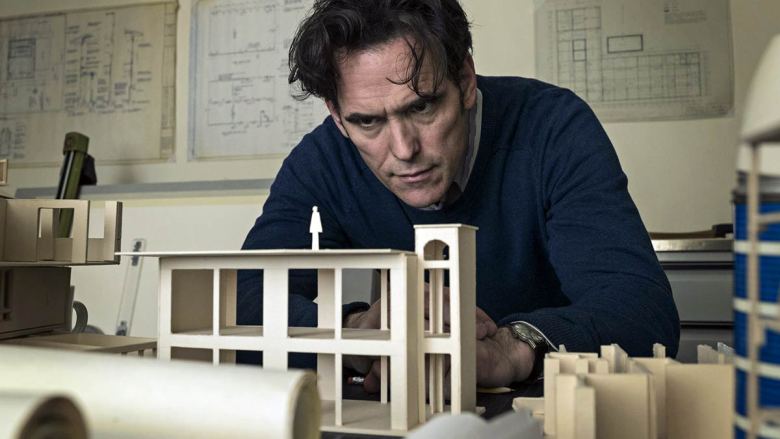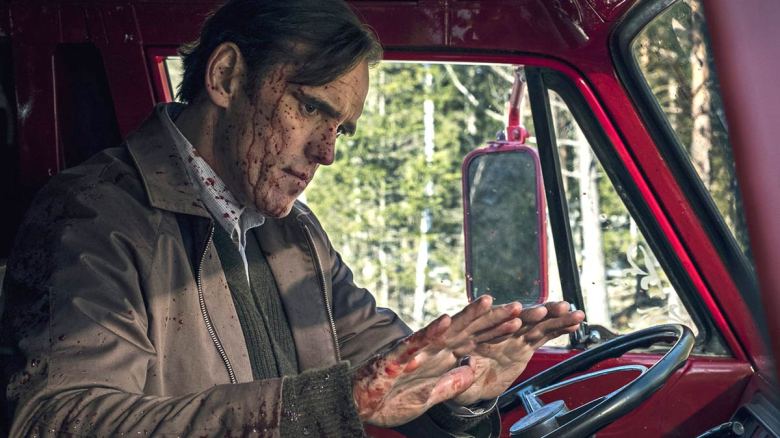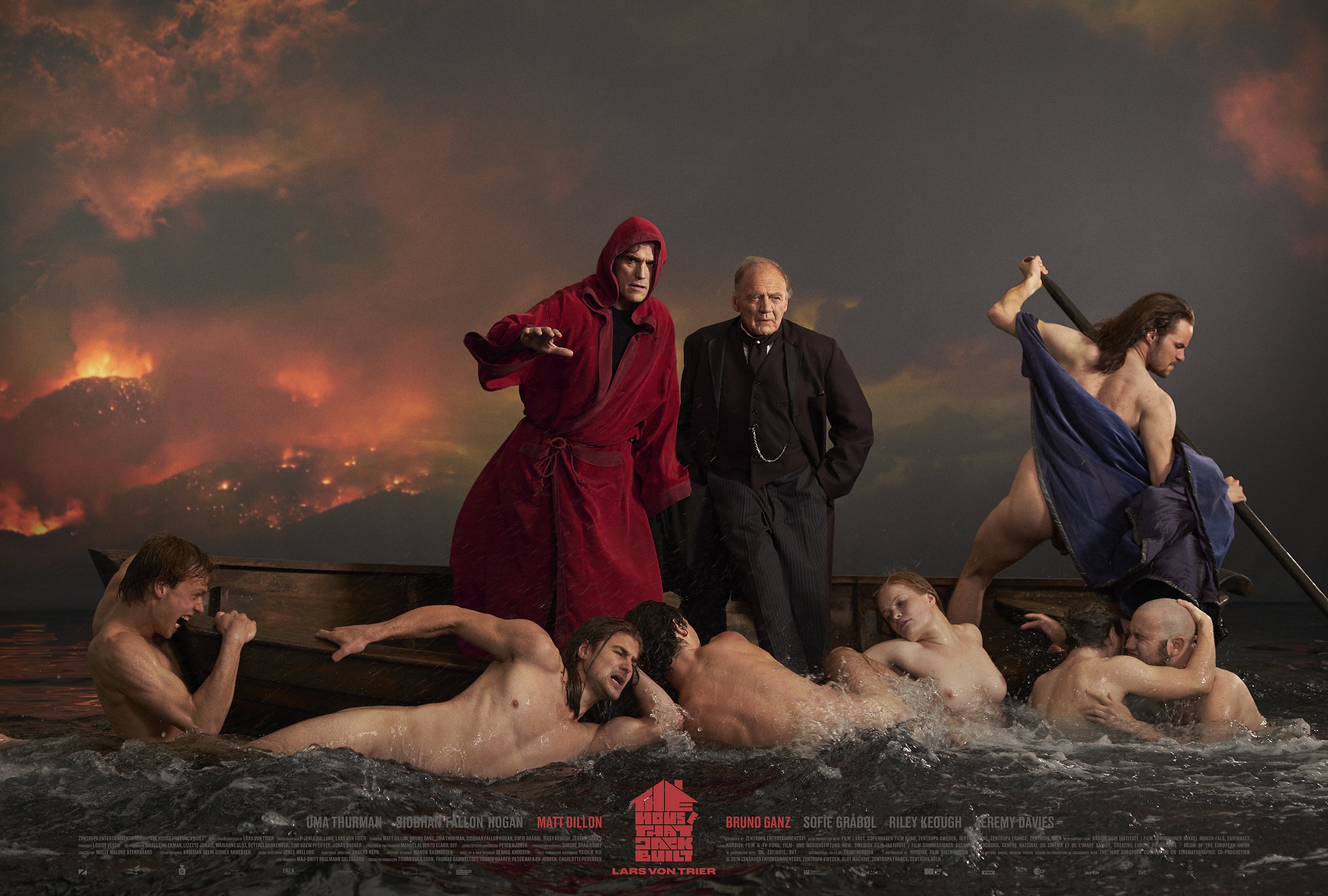A Lars von Trier film about a serial killer – what else are you going to expect from this? Although it can be hard to guess the quality of this Dane’s new film, as he’s done marvellous work recently with Antichrist and Melancholia, slipped up in narcissism and grandiosity with Nymphomaniac (both Volumes). Yet with The House That Jack Built, he is snugly in comfortable territories, working cinematic wonders with his filmic playfulness, this character study, and on-screen content that is deranged and disturbing to the maximum degree.
There’s sloppiness here and there in this 155-minute film, but this is one of those great films that admittedly feels slapped together (almost on a Jackson Pollock level). von Trier packs so many ideas and musings into this fairly skeletal and inconsequential story, it’s as if he’s scooped out his brain, thrown it into a blender and turned it on with the cap off.
It’s often not very subtle about itself and the claims it’s making, but a slap across the nuts can never be subtle. Its spotlighting of the ubiquity of modern apathy (a la another serial killer film, American Psycho) is not hard to miss and becomes etched in the mind whenever it becomes harshly highlighted.
Yet The House That Jack Built is hardly a finger-waving didactic kind of film. It’s still reserved with its moral compass, as von Trier never allows his own beliefs on morality to clash with those of Jack’s. The film often merely presents the number of murders (referred to in the chapter intertitles as ‘incidents’) simply through the warped inhuman perspective of Jack (Matt Dillon, in a terrific and career-defining role). These incidents are a thrill to watch, though perhaps only if you’re a sicko like me.
The film is so successful in conveying a visceral impact through these torturously elongated scenes, whether it be of humour or tension. Each incident feels like observing another part of Jack’s warped brain, whether it’s conveying Jack’s troubled impulsive nature, contradictory values of sentient beings, or how his evil highlights the modern apathy. Jack laments that he feels gifted from above because of how lucky he has been in evading punishment for his crimes, yet he comes across as anti-social and moronic with his ill-conceived efforts in his murders and their ensuing clean-up, which certainly makes his bumbling improvisation with these matters quite nail-bitingly hilarious to observe.
But it’s not all killings, blood, and guts. As Jack confides in the mysterious figure Verge (Bruno Ganz), he relays many of his feelings and opinions on art and how it has a place in the world, as well as how it relates to his immoral acts. Of course, these moments are likely von Trier talking to himself, though he again displays some directorial prowess in how he audaciously places all sorts of works of art, stock footage, and historical footage to convey these complicated and never-definite ideas. However, this is also where he allows the film to be its most cringy: when Jack discusses the use of art, von Trier actually then shows snippets from his own films — and they’re not even displayed in the right aspect ratio! This moment of self-fellatio is not too unexpected of von Trier, but I guess with him, you sometimes got to take the cringe with the amazing.
After all this brash childishness, boyishness, edginess, silliness, and immaturity, (the vast majority of which is successfully executed, mind you), the film reaches its epilogue and these last fifteen minutes or so are not only a stunning and ballsy work of art themselves, but they contextualise all the atrocities we have just been subjected to, giving them a whole new meaning. von Trier’s unique kind of super slo-mo shots (that he had previously devised in Antichrist and Melancholia) that appear like slowly moving neoclassical paintings showcase astonishing artful mise en scene, and are particularly appropriate as a certain portion of the film is dedicated to discussions of art.
Recommended: Antichrist Review – An unnerving portrait of Grief, Pain and Despair.
We follow Jack as he takes a hellish journey deep within the souls of himself, the world, and humanity. After a great deal of very literal scenes (shot in von Trier’s usual docu-drama manner), the film then transforms into a bizarre, yet incredible and surreal analogy that so wonderfully utilises the medium of film to curiously and seriously examine the evils of our existence. It’s such a shame that so many people walked out on this film in its premiere at Cannes — it makes sense that they would, given the troubling on-screen content, but it’s all capped off in the most glorious way come the film’s transcendent ending. If you’re a film critic and you walk out on a film, go fuck your dad.
The House That Jack Built, although sometimes flawed, is mostly an accomplishment. It starts off funny, then becomes tense, then becomes internal as it reflects on the universal nature of evil and amorality. It is the work of an artist who not only has a burning intensity within himself that he successfully translate to this film, but he also proves he’s a master at luring an audience through a range of moods and ideas through this highly and very purposefully provocative film, all of which aren’t defiantly laid out, but simply mused on. This is my favourite film of 2018 so far, one of von Trier’s best, and I’m sure it won’t appeal to everyone, but it’s an important film for those who wish to see it.





